MUFG N0W (Net Zero World) launches in Vietnam
MUFG N0W (Net Zero World) is the flagship environmental, social, and governance (ESG) event and networking platform held by MUFG Bank that engages the private and public sectors to address the challenges and opportunities of Asia’s sustainable development.
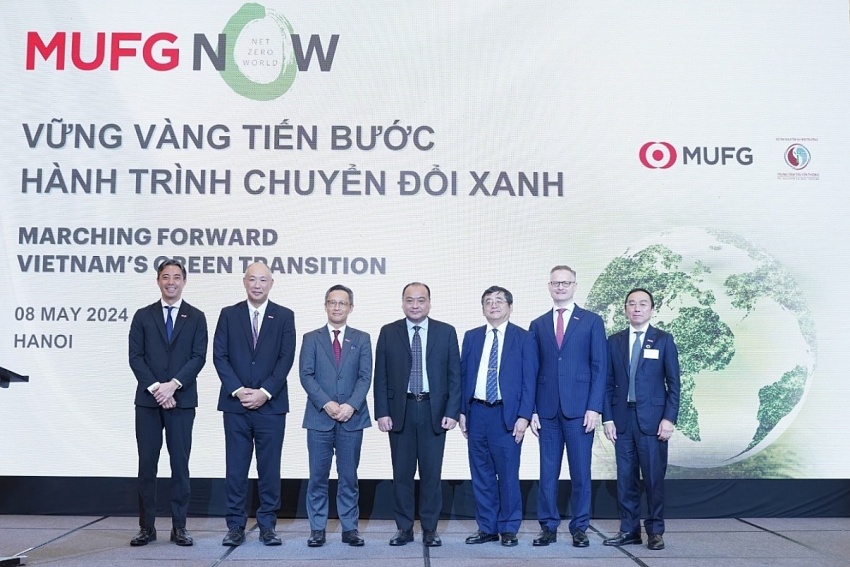 |
| MUFG senior executives and guests of honour from the Ministry of Natural Resources and Environment |
Vietnam has made impressive strides in its energy transition journey: its global ranking in terms of installed solar capacity has risen from 196th to 8th in the past 10 years, and it leads all ASEAN nations for the share of renewables in its power mix.
The conference also discussed the key imperatives to making further progress on greening Vietnam's energy system, spurring technology development, and mobilising sustainable finance through policy support.
In his opening remarks, Masakazu Osawa, MUFG Bank’s chief executive for Asia Pacific, emphasised the need for urgent action towards tackling climate change.
“While Asia is the fastest-growing region globally, we have the most to lose from global warming, with a recent report by the WMO stating that Asia remained the world’s most disaster-hit region from weather, climate and water-related hazards in 2023”, he said. “We also believe that for Asia to decarbonise, we need to focus on engagement instead of divestment, in this case through proactive regulatory outreach and financial support.”
Mobilising transition finance to unlock capital
Finance is a key enabler of change. However, only about 14 per cent of global climate finance has been channelled to Asia, excluding China.
Edward Clayton, senior partner of PwC, said that capital flows into Asia, particularly Vietnam, were driven by substantial infrastructure needs and the demand for green financing.
"Global investors have a keen interest towards financing renewable infrastructure and green projects. However, a gap exists between the funding required and provided due to Vietnam’s still-emerging institutional setup, which hampers speedy and effective transition financing," he said.
On expanding what could be financed under transition, Ly Thu Nga, team leader of the Green Financial Sector Reform Component of the Macroeconomic Reform/Green Growth Program, German Agency for International Cooperation (GIZ), said, “Transition finance needs to also focus on decarbonising economic, high-carbon sectors and financing green economic activities, with a balance in achieving economic growth and addressing net-zero targets.”
Speaking on projects that would be considered under transition finance, John Rockhold, president of Pacific Rim Investment and Management and head of VBF Power and Energy's working group, shared his view on the nature of projects that would enable energy security in Vietnam.
"Coal and gas are expected to be the near-term priority, gradually phased out beyond 2030 through a planned transition that is just and does not disrupt livelihoods. The bankability of electricity generation projects is expected to improve as revised power purchase agreement terms are being reviewed by both private and public sectors," Rockhold said.
Providing insights on how Japanese financial institutions finance energy transition in Asia, Toru Aguin, chief representative in Hanoi at the Japan Bank for International Cooperation (JBIC), explained that gas was seen as a transition energy source and JBIC will mobilise capital to support the construction and set-up of new gas-fired power plants in Vietnam.
He further detailed the hurdles related to the transmission of renewable energy, legal constraints, and the rapidly changing business environment for decarbonisation, suggesting that external support from Japan could possibly help to alleviate some of these issues through prior experience in developing energy supply chains.
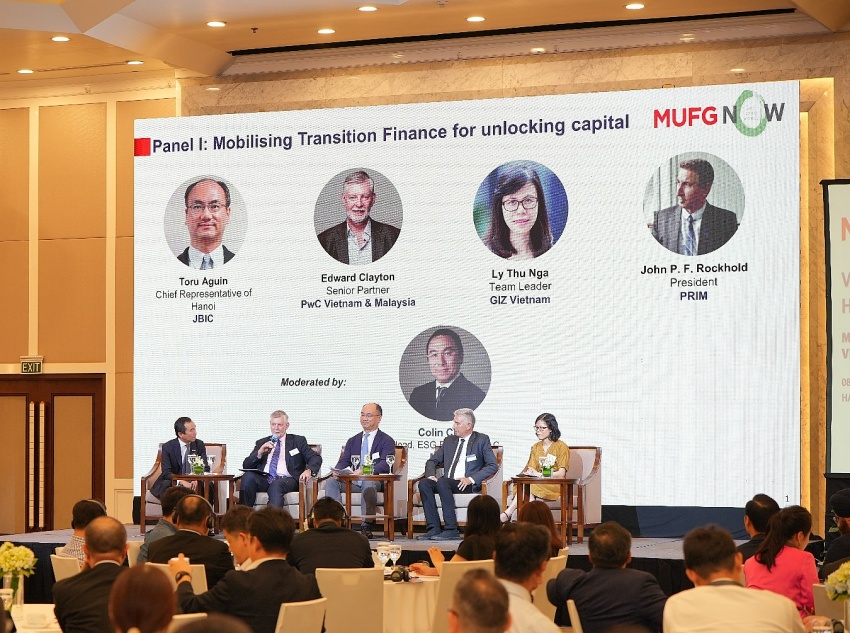 |
Decoding decarbonisation pathways
Vietnam’s climate tech sector holds great potential to combine both digital and green transformation initiatives to pave the way for the country’s transition journey.
Vu Minh Ly, deputy general director at the Ministry of Natural Resources and Environment's (MoNRE) Centre for Natural Resources and Environment Communication, said, "As the standing body of the JETP of the government, the secretariat has developed and issued an action plan to implement the JETP."
"It includes many important aspects such as improving the institutional set-up, promoting the transition from coal power to clean energy (according to Power Development Plan VIII), developing plans for the efficient and economical use of energy, and international cooperation to achieve the net-zero goal by 2050."
"To capture these opportunities for Vietnam, various ministries are supporting the development of a pilot carbon market by 2025."
Experts and leaders from Mitsubishi Heavy Industries, Keppel EaaS Vietnam, Zeroboard, and MUFG Bank discussed and recommended some solutions on decoding carbon emissions like the adoption of small power generation systems operating on 100 per cent natural gas; new technology such as carbon capture, hydrogen, and ammonia; generating carbon credit and import renewable resources from countries like Laos and Cambodia; measuring their greenhouse gas emissions and determining where the bulk of emissions are; and commitment to raising its sustainable finance target to JP¥100 trillion by 2030.
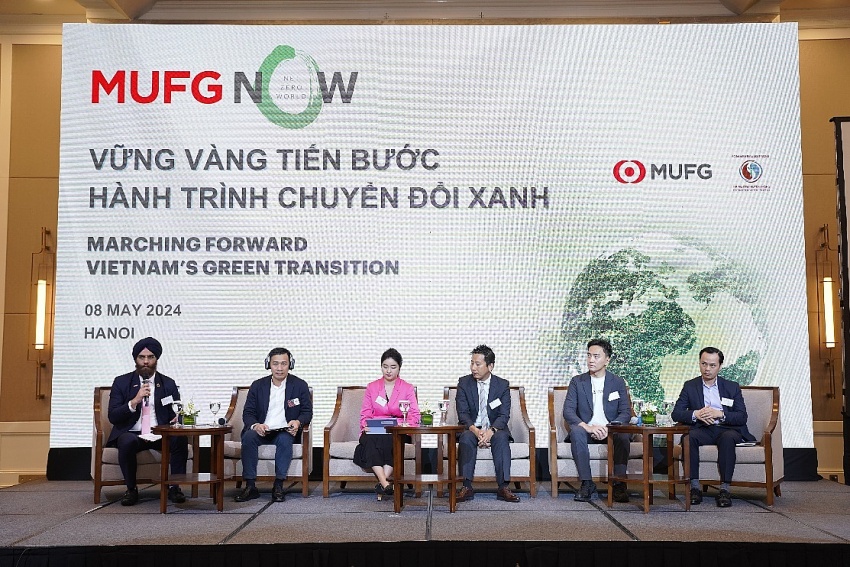 |
| Executives from the MoNRE and leading energy and technology companies shared their insights on the latest transition technologies and their suitability for Vietnam’s purposes |
More policy support and public-private partnerships
To make further progress on greening the country’s energy system, the government’s role of enhancing Vietnam’s policy landscape will play a vital role for private financiers and investors, said Osawa.
“To achieve Vietnam’s power development plan to shift its power mix to more sustainable sources, policymakers can play a bigger regulatory role, from the Investment Law to the Power Purchase Agreement framework. This instils greater confidence in Vietnam’s openness to attracting investment into its power sector and other types of green financing,” he said. “For MUFG, we have been using our global network to engage with key stakeholders across the world to not only mobilise capital but promote collaboration and knowledge exchange. We have spoken up for Asia on global bodies such as GFANZ and are a participant in key decarbonisation initiatives in Asia, such as the JETP project in Vietnam. We are also part of the Asia Zero Emission Community, which promotes net-zero cooperation between Asian countries, especially learning from Japan’s decarbonisation experience.”
Kojima Masao, MUFG’s regional head of Vietnam, added, “Through MUFG’s comprehensive suite of ESG financing solutions, companies can play a more active role in Vietnam’s sustainable development journey. With our strong track record in ESG financing and experience in renewables and clean energy sectors, MUFG, together with our strategic partner VietinBank, will continue to engage our clients to support their ESG commitments and targets.
In April, MUFG Vietnam officially commenced its chairmanship of the Banking Working Group, one of the most active working groups under the Vietnam Business Forum. The association aims to contribute to positive changes in Vietnam’s banking sector and advocate for greater public and private engagement and an enhanced regulatory framework in the service of Vietnam’s energy transition agenda.”
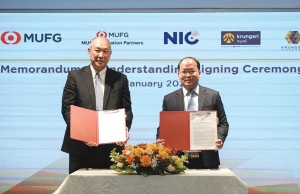 | MUFG and NIC jointly propel Vietnam’s startup ecosystem A new partnership will support the development of Vietnamese startups in international markets while introducing global and Japanese tech firms to Vietnam’s opportunities. |
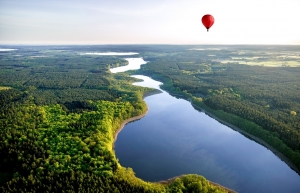 | MUFG’s BWG chairmanship begins in April MUFG Vietnam will take over the chair of the Banking Working Group (BWG), one of the most active working groups under the Vietnam Business Forum (VBF) from April 1. The VBF serves as a regular and high-level channel of communication between the business community and the government. |
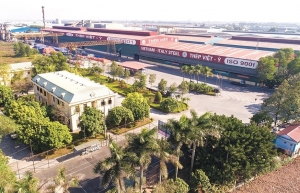 | MUFG’s BWG chairmanship begins in April MUFG Vietnam took over the chair of the Banking Working Group (BWG), one of the most active working groups under the Vietnam Business Forum, from April 1. The forum serves as a regular and high-level channel of communication between the business community and the government. |
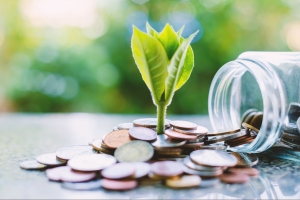 | MUFG pilots sustainable deposit scheme in Vietnam MUFG has piloted sustainable deposits in Vietnam with placements by Taikisha Vietnam Engineering, Acecook Vietnam, and Arcelik Hitachi Home Appliances Sales Vietnam. |
What the stars mean:
★ Poor ★ ★ Promising ★★★ Good ★★★★ Very good ★★★★★ Exceptional
Related Contents
Latest News
More News
- $100 million initiative launched to protect forests and boost rural incomes (January 30, 2026 | 15:18)
- Trung Nam-Sideros River consortium wins bid for LNG venture (January 30, 2026 | 11:16)
- Vietnam moves towards market-based fuel management with E10 rollout (January 30, 2026 | 11:10)
- Envision Energy, REE Group partner on 128MW wind projects (January 30, 2026 | 10:58)
- Vingroup consults on carbon credits for electric vehicle charging network (January 28, 2026 | 11:04)
- Bac Ai Pumped Storage Hydropower Plant to enter peak construction phase (January 27, 2026 | 08:00)
- ASEAN could scale up sustainable aviation fuel by 2050 (January 24, 2026 | 10:19)
- 64,000 hectares of sea allocated for offshore wind surveys (January 22, 2026 | 20:23)
- EVN secures financing for Quang Trach II LNG power plant (January 17, 2026 | 15:55)
- PC1 teams up with DENZAI on regional wind projects (January 16, 2026 | 21:18)

 Tag:
Tag:


























 Mobile Version
Mobile Version